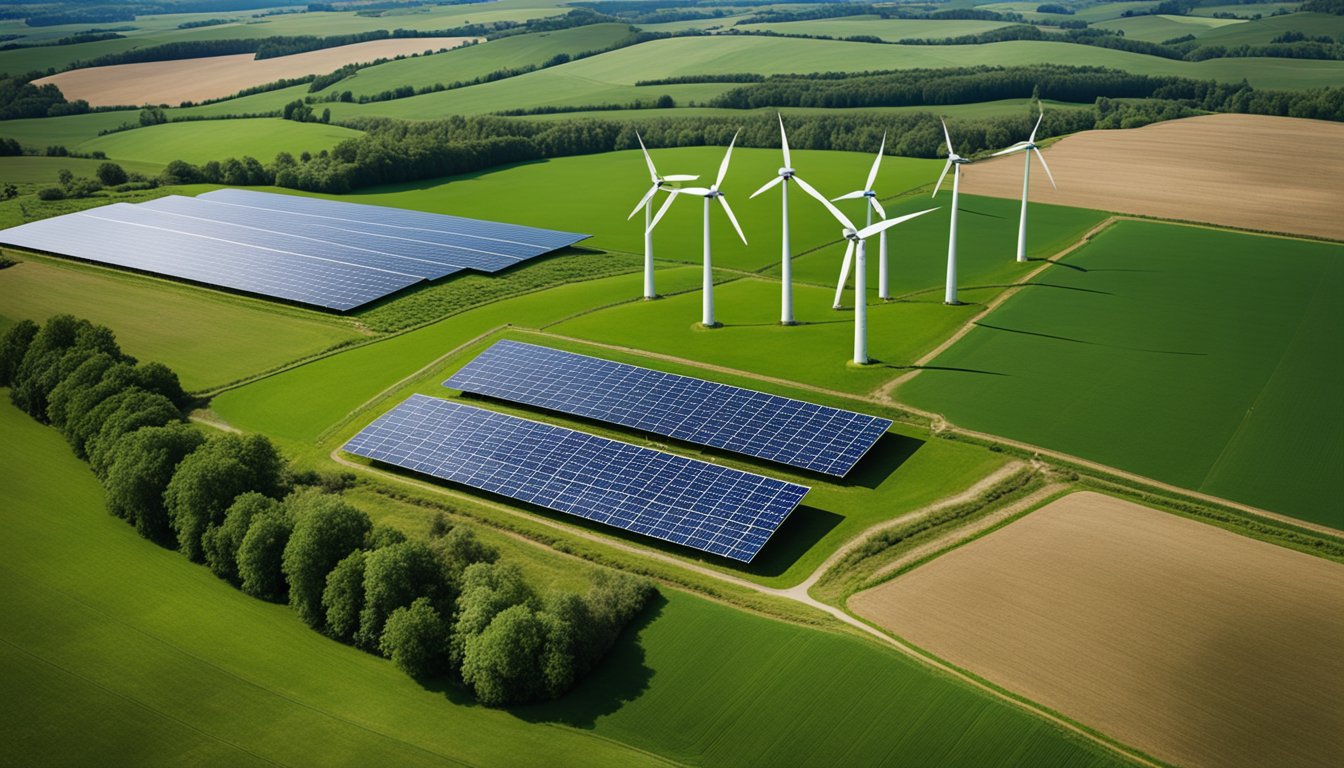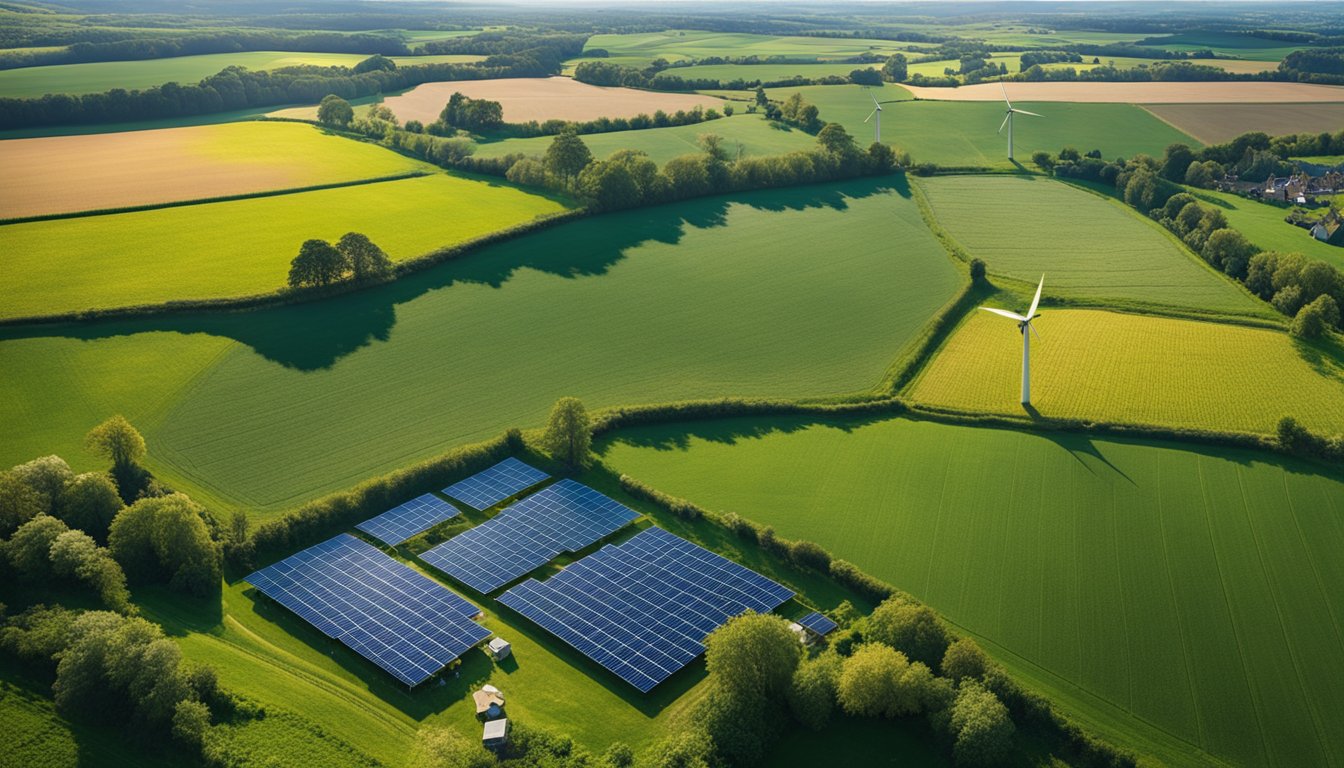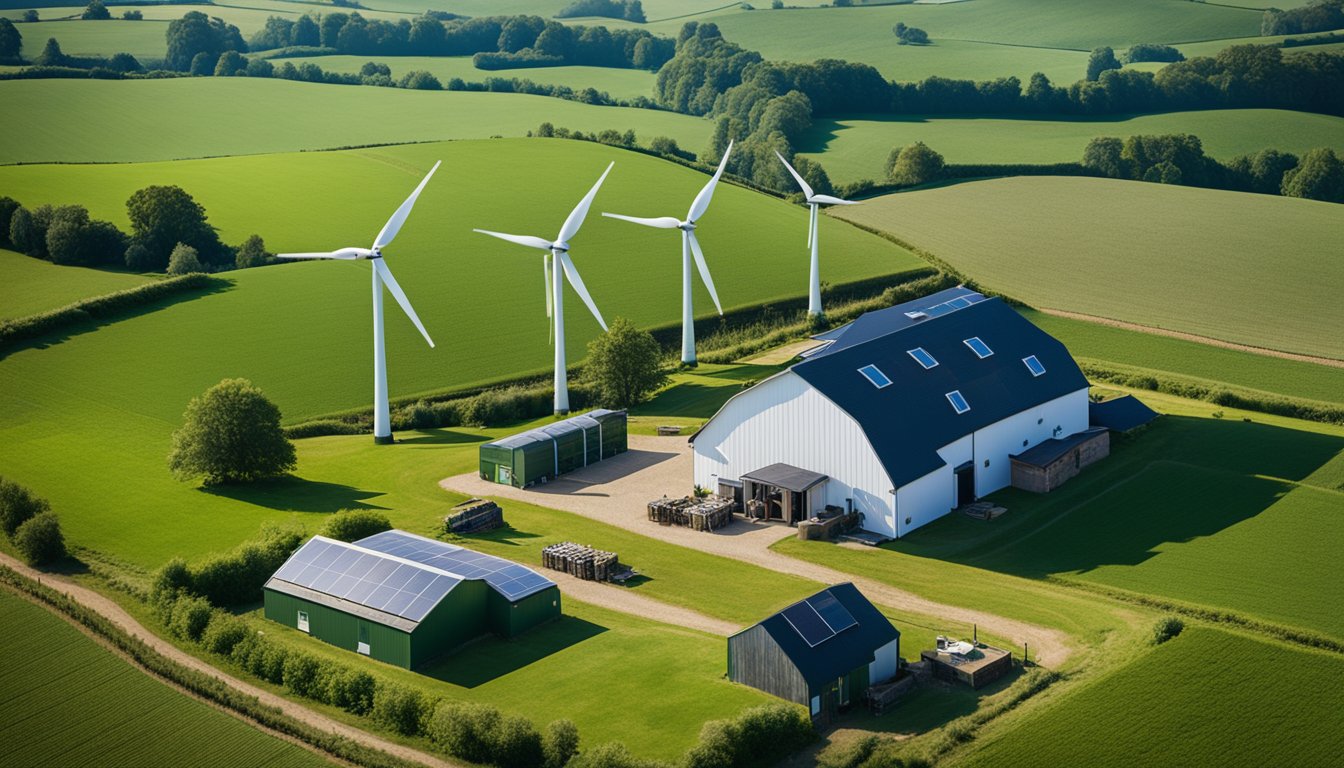Late updated: 27 Nov 2024 11:11
Written by: Oliver Bennett
Optimising Renewable Energy for UK Farm Sustainability: Strategies for Eco-Friendly Growth
Farms across the UK are confronted with the pressing need to embrace energy solutions that not only enhance productivity but also safeguard the environment. As conventional energy resources become scarcer and more costly, optimising renewable energy sources emerges as a pivotal strategy for bolstering farm sustainability in the UK. Our exploration into this essential shift unveils how integrating sustainable energy practices with innovative technologies can serve as a beacon for successful ecological and economic farming.

Adopting renewable energy technologies is not merely about reducing emissions; it’s about transforming the very fabric of agricultural practices. The increasing popularity of solar panels and wind turbines on farms highlights a promising trend towards self-reliance and energy security. This strategic alignment with sustainable energy sources equips farmers with the tools they need to navigate fluctuating market conditions and climatic challenges.
Furthermore, the synergy between renewable energy adoption and sustainable farming techniques can facilitate a resilient agricultural framework. By aligning our practices with these advancements, we bolster our collective capacity to not only sustain but thrive. The dual focus on energy efficiency and ecological responsibility is key to preserving our agricultural legacy for future generations.
Key Takeaways
- Renewable energy is vital for UK farm sustainability.
- Technological advancements aid sustainable agricultural practices.
- Integration enhances energy security and ecological resilience.
Advancements in Renewable Energy Technologies

In our exploration of optimising renewable energy for farm sustainability in the UK, recent advancements offer promising ways to reduce greenhouse gas emissions and enhance energy efficiency. These innovations span various energy sources and technologies, supporting greater energy independence.
Harnessing Solar Power
Solar energy presents a significant opportunity for farms through the deployment of solar panels and photovoltaic systems. These technologies convert sunlight directly into electricity, providing a sustainable and economical power source.
In the UK, the investment in solar installations has surged due to decreasing costs and improved efficiency. Solar photovoltaic modules now boast increased resilience and energy conversion rates, making them highly suitable for diverse farming needs. Furthermore, combining solar energy with battery storage can secure energy supply even during low sunlight periods, enhancing reliability.
Wind Energy Potential
Wind energy is another vital resource that can propel UK farms towards sustainability. Onshore and offshore wind projects have seen substantial technological improvements, with advanced turbines providing greater energy yields.
The UK’s geographical position offers optimal settings for wind energy generation. Investing in this sector diminishes the carbon footprint and aligns with energy independence goals. Modern turbine technology includes innovations such as improved blade designs and materials that enhance performance even at lower wind speeds, thus broadening the potential sites for installation.
Biomass and Biofuels
Biomass and biofuels present a renewable alternative by utilising organic materials like wood pellets and agricultural waste for energy production. These resources can be converted into electricity or used for heating purposes, adding a sustainable element to farm operations.
The conversion processes have become more efficient, translating to higher energy outputs and lower emissions. For UK farms, adopting biomass technology can also contribute to waste reduction and cyclical energy solutions, reinforcing a sustainable agricultural ecosystem.
Innovative Energy Storage Solutions
Energy storage technologies have seen substantial progress, enabling more efficient use of renewable energy sources. Battery storage systems, including lithium-ion and emerging hydrogen solutions, play a crucial role in balancing supply and demand.
These systems ensure that excess energy generated during peak periods is stored and utilised when production is low. Solar and wind integration with battery storage enhances the reliability of renewable energy applications on farms. Moreover, hydrogen as an energy carrier offers long-term storage options, potentially revolutionising energy strategies with its versatility and efficiency improvements.
Overall, these advancements promote sustainability, energy independence, and a reduced environmental impact for UK farms.
Farming Practices for Energy and Ecological Sustainability
In addressing the dual challenges of energy efficiency and ecological balance on UK farms, we focus on sustainable methods that enhance soil health, diversify resources, and reduce reliance on fossil fuels. Our efforts aim to boost biodiversity, contributing to climate change adaptation and ensuring long-term food security.
Sustainable Crop and Soil Management
Sustainable crop and soil management are pivotal to improving ecological sustainability on farms. By rotating crops and utilising cover crops, we can enhance soil health and maintain nutrient levels. Such practices minimise soil erosion and improve water retention, crucial for rural areas in Wales and beyond.
Incorporating organic matter, such as compost, further enriches the soil, promoting stronger crop yields. Conservation tillage methods can significantly reduce carbon emissions, aligning with our net zero goals. In tandem with smart irrigation, these practices ensure that the energy used for farming activities is optimised for both production and environmental stewardship.
Diversification and Resource Allocation
Diversification involves integrating various agricultural activities to maximise resource efficiency and ensure economic growth. By raising multiple crops and livestock, we can better allocate resources, leading to more resilient farming systems. Diversification also opens opportunities for farmers to enter Contracts for Difference, facilitating better energy pricing and financial stability.
Intercropping and polyculture not only improve soil health but also enhance ecosystem services by attracting beneficial insects and promoting a balanced ecosystem. This approach boosts energy security, supporting smaller microgrids in rural locales while decreasing dependency on larger networks.
Reducing the Dependence on Fossil Fuels
Reducing our reliance on fossil fuels is central to achieving sustainable energy goals. Switching to renewable energy sources like solar, wind, and biomass for on-farm operations can significantly cut down emissions. Implementing on-site microgrids ensures a stable energy supply, independent of the national grid.
Investments in energy-efficient technologies help optimise energy consumption, reducing overall operating costs. As we transition towards cleaner energy, smart contracts can facilitate energy trading, ensuring a steady supply while respecting the carbon budget. This shift strengthens local energy independence and bolsters environmental sustainability.
Enhancing Biodiversity and Ecosystem Health
Biodiversity is vital for maintaining ecosystem health and resilience. Our farms must support a variety of species by maintaining natural habitats and implementing hedgerows and buffer zones. By doing so, farms can sustain healthy populations of pollinators, crucial for crop production.
Implementing agroforestry systems integrates trees into farming landscapes, enhancing carbon sequestration and providing habitat corridors. This not only supports wildlife but also contributes to climate change adaptation strategies. Our focus is on creating a harmonious balance where agriculture contributes positively to the natural environment, fostering both immediate productivity and long-term sustainability.
Frequently Asked Questions

Our focus is on how UK farms can leverage renewable energy for sustainability. Key aspects include identifying viable energy sources, integrating systems into current agricultural infrastructure, and exploring policy developments and incentives. We also consider the environmental benefits of these energy solutions.
What are the most viable renewable energy sources for rural farms in the UK?
Solar and wind power are foremost among the renewable energy options for rural UK farms. Solar panels can be installed on farmland with minimal disruption, while wind turbines harness natural resources available in many rural areas.
How can UK farmers integrate renewable energy systems into their existing infrastructure?
Farmers can install solar panels on rooftops of barns or over fields that double as pastureland. Implementing wind turbines on open land can be another strategic move. Energy storage solutions, like batteries, optimise energy use by storing excess energy generated during peak production periods.
What are the latest developments in sustainable energy policy in the UK for agriculture?
There has been an increased emphasis on policies promoting renewable energy adoption in agriculture. Recent initiatives support infrastructure investments that align with sustainability goals, making it easier for farmers to access grants for installing renewable systems.
How do renewable energy solutions contribute to the long-term sustainability of UK farms?
Renewable energy helps reduce operational costs, lowering energy bills and providing a sustainable energy supply. By decreasing reliance on fossil fuels, farms can mitigate their environmental impact and ensure energy independence, crucial for economic resilience.
What incentives are available to UK farmers for investing in renewable energy?
The UK government and some local authorities offer grants and tax relief for installing renewable energy systems. Schemes like the Feed-In Tariffs and the Renewable Heat Incentive are designed to compensate farmers for producing and exporting renewable energy.
What are the environmental impacts of adopting renewable energy on UK farms?
Adopting renewable energy helps reduce greenhouse gas emissions and lowers the carbon footprint of farms. Solar installations can coexist with agricultural activities, preserving biodiversity, while reducing pollution and conserving natural resources.
